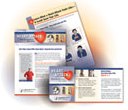What To Expect Before Coronary Angioplasty
Coronary angioplasty is done in a hospital. A cardiologist will perform the procedure. A cardiologist is a doctor who specializes in diagnosing and treating heart diseases and conditions.
If angioplasty isn't done as an emergency treatment, you'll meet with your cardiologist beforehand. He or she will go over your medical history (including the medicines you take), do a physical exam, and talk to you about the procedure.
Your doctor also may recommend tests, such as blood tests, an EKG (electrocardiogram), and a chest x ray.
Once the angioplasty is scheduled, your doctor will advise you:
- When to begin fasting (not eating or drinking) before the procedure. Often, you have to stop eating and drinking 6–8 hours before the procedure.
- What medicines you should and shouldn't take on the day of the procedure.
- When to arrive at the hospital and where to go.
Even though angioplasty takes only 1–2 hours, you'll likely need to stay in the hospital overnight. Your doctor may advise you to not drive for a certain amount of time after the procedure. Thus, you'll probably need to arrange a ride home.
Clinical trials are research studies that explore whether a medical strategy, treatment, or device is safe and effective for humans. To find clinical trials that are currently underway for Coronary Angioplasty, visit www.clinicaltrials.gov.
November 14, 2011
Delayed stem cell therapy following heart attack is safe but not effective
Stem cells obtained from bone marrow, known as BMCs, can be safely injected into people 2-3 weeks following a heart attack, reports a new clinical trial supported by the National, Heart, Lung, and Blood Institute (NHLBI), part of the National Institutes of Health. However, while safe, the BMCs did not improve heart function six months after their administration.

When a heart attack happens, any delays in treatment can be deadly.
Knowing the warning symptoms of a heart attack and how to take action can save your life or someone else’s.
The NHLBI has created a new series of informative, easy-to-read heart attack materials to help the public better understand the facts about heart attacks and how to act fast to save a life.
Click the links to download or order the NHLBI's new heart attack materials:
“Don’t Take a Chance With a Heart Attack: Know the Facts and Act Fast” (also available in Spanish)
“Heart Attack: Know the Symptoms. Take Action.”
“Learn What a Heart Attack Feels Like—It Could Save Your Life”
The NHLBI updates Health Topics articles on a biennial cycle based on a thorough review of research findings and new literature. The articles also are updated as needed if important new research is published. The date on each Health Topics article reflects when the content was originally posted or last revised.
















